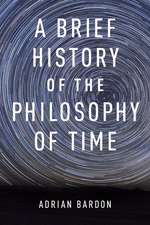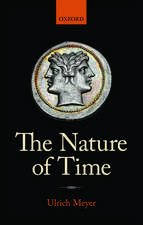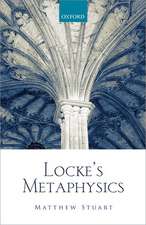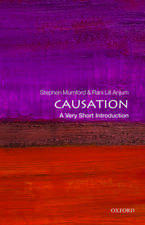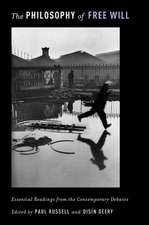The Limits of Free Will
Autor Paul Russellen Limba Engleză Hardback – 9 noi 2017
Preț: 534.53 lei
Preț vechi: 714.68 lei
-25% Nou
Puncte Express: 802
Preț estimativ în valută:
102.31€ • 111.17$ • 85.100£
102.31€ • 111.17$ • 85.100£
Carte tipărită la comandă
Livrare economică 10-16 aprilie
Preluare comenzi: 021 569.72.76
Specificații
ISBN-13: 9780190627607
ISBN-10: 0190627603
Pagini: 312
Dimensiuni: 157 x 236 x 28 mm
Greutate: 0.54 kg
Editura: Oxford University Press
Colecția OUP USA
Locul publicării:New York, United States
ISBN-10: 0190627603
Pagini: 312
Dimensiuni: 157 x 236 x 28 mm
Greutate: 0.54 kg
Editura: Oxford University Press
Colecția OUP USA
Locul publicării:New York, United States
Recenzii
It was both a pleasure and a revelation to revisit these articles together as a group, and to see what a powerful and unified vision of the nature of human freedom and responsibility Russell has put forward over these many years. What comes out most clearly after sustained engagement with Russell's work is his deep humanity and his clear-eyed appreciation of what he takes to be our basic human predicament: namely, that we must see ourselves as free and morally responsible agents, even as we recognize the myriad ways in which luck and fate play an ineliminable role in shaping the moral quality of our lives.
The Limits of Free Will is a marvelous collection of papers by Paul Russell. It is full of insightful and illuminating critiques, but it also provides readers with an interesting and distinctive position on free will and moral responsibility ... Russell's unique blend of pessimism and optimism is highly compelling and his arguments beautifully crafted, with great sensitivity to our deepest human concerns. The volume is enormously enlightening and will reward its readers many times over.
The free will debate is notoriously deadlocked, and Russell's work thoughtfully opens up new areas of philosophical exploration. But more importantly, Russell's philosophical facing-up to our limits as natural beings embodies intellectual humility and humanity in equal measure. As a young scholar, I am especially grateful to have encountered his work.
What stands out especially about this collection is the way in which Russell marries matters of fate and luck with our conception of ourselves as agents more broadly beyond the moral realm ... The merits of this collection go well beyond being a valuable compendium of critical assessment of contemporary optimism and skepticism about moral responsibility. Russell harnesses decades of reflection on moral responsibility to construct a distinctive yet measured compatibilist alternative, one that acknowledges the limits of human control while upholding the dignity of our moral life.
These are all uniformly excellent papers, beautifully written and offering a unique and important perspective on the topics of free will and moral responsibility.
Paul Russell's subtle, incisive, and deeply human essays have had enormous influence on work in agency and responsibility for going on three decades. One cannot understand the state of play in many of the wide range of topics in the field without grappling with Russell's sharp critical insights and deftly drawn positions.
This is the Golden Age of free will philosophy. Paul Russell is a very significant participant in this, and moreover a philosopher with a distinct and rare voice. This volume will be very welcome in this respect, rightly positioning him as a central figure in the contemporary free will debate.
The Limits of Free Will is a marvelous collection of papers by Paul Russell. It is full of insightful and illuminating critiques, but it also provides readers with an interesting and distinctive position on free will and moral responsibility ... Russell's unique blend of pessimism and optimism is highly compelling and his arguments beautifully crafted, with great sensitivity to our deepest human concerns. The volume is enormously enlightening and will reward its readers many times over.
The free will debate is notoriously deadlocked, and Russell's work thoughtfully opens up new areas of philosophical exploration. But more importantly, Russell's philosophical facing-up to our limits as natural beings embodies intellectual humility and humanity in equal measure. As a young scholar, I am especially grateful to have encountered his work.
What stands out especially about this collection is the way in which Russell marries matters of fate and luck with our conception of ourselves as agents more broadly beyond the moral realm ... The merits of this collection go well beyond being a valuable compendium of critical assessment of contemporary optimism and skepticism about moral responsibility. Russell harnesses decades of reflection on moral responsibility to construct a distinctive yet measured compatibilist alternative, one that acknowledges the limits of human control while upholding the dignity of our moral life.
These are all uniformly excellent papers, beautifully written and offering a unique and important perspective on the topics of free will and moral responsibility.
Paul Russell's subtle, incisive, and deeply human essays have had enormous influence on work in agency and responsibility for going on three decades. One cannot understand the state of play in many of the wide range of topics in the field without grappling with Russell's sharp critical insights and deftly drawn positions.
This is the Golden Age of free will philosophy. Paul Russell is a very significant participant in this, and moreover a philosopher with a distinct and rare voice. This volume will be very welcome in this respect, rightly positioning him as a central figure in the contemporary free will debate.
Notă biografică
Paul Russell is Professor in Philosophy at the University of British Columbia and Lund University. His publications include Freedom and Moral Sentiment: Hume's Way of Naturalizing Responsibility (Oxford University Press, 1995); The Riddle of Hume's Treatise: Skepticism, Naturalism, and Irreligion (Oxford University Press, 2008); and editor of The Philosophy of Free Will (Oxford University, 2013).

